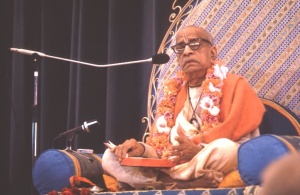SB 11.2.18: Difference between revisions
m (1 revision(s)) |
No edit summary |
||
| Line 1: | Line 1: | ||
{{info | {{info | ||
|speaker= | |speaker=Nārada Muni | ||
|listener=King Vasudeva | |listener=King Vasudeva | ||
}} | }} | ||
[[Category:Srimad-Bhagavatam - Canto 11 Chapter 02]] | |||
[[Category:Bhagavatam Verses Spoken by Narada Muni - Vanisource|110218]] | |||
<div style="float:left">'''[[Srimad-Bhagavatam]] - [[SB 11|Eleventh Canto]] - [[SB 11.2: Maharaja Nimi Meets the Nine Yogendras|Chapter 2: Mahārāja Nimi Meets the Nine Yogendras]]'''</div> | |||
<div style="float:right">[[File:Go-previous.png|link=SB 11.2.17]] '''[[SB 11.2.17]] - [[SB 11.2.19]]''' [[File:Go-next.png|link=SB 11.2.19]]</div> | |||
{{RandomImage}} | |||
{{SBnotice}} | |||
==== TEXT 18 ==== | ==== TEXT 18 ==== | ||
<div | <div class="verse"> | ||
sa bhukta-bhogāṁ tyaktvemāṁ | :sa bhukta-bhogāṁ tyaktvemāṁ | ||
nirgatas tapasā harim | :nirgatas tapasā harim | ||
upāsīnas tat-padavīṁ | :upāsīnas tat-padavīṁ | ||
lebhe vai janṛnabhis tribhiḥ | :lebhe vai janṛnabhis tribhiḥ | ||
</div> | </div> | ||
| Line 17: | Line 22: | ||
==== SYNONYMS ==== | ==== SYNONYMS ==== | ||
<div | <div class="synonyms"> | ||
saḥ—he; bhukta—used up; bhogām—all the pleasures; tyaktvā—rejecting; imām—of this (earth); nirgataḥ—having left home; tapasā—by austerities; harim—the Supreme Lord, Hari; upāsīnaḥ—having worshiped; tat-padavīm—His destination; lebhe—he achieved; vai—indeed; janmabhiḥ—in births; tribhiḥ—three. | saḥ—he; bhukta—used up; bhogām—all the pleasures; tyaktvā—rejecting; imām—of this (earth); nirgataḥ—having left home; tapasā—by austerities; harim—the Supreme Lord, Hari; upāsīnaḥ—having worshiped; tat-padavīm—His destination; lebhe—he achieved; vai—indeed; janmabhiḥ—in births; tribhiḥ—three. | ||
</div> | </div> | ||
{{SBcollapse}} | |||
==== TRANSLATION ==== | ==== TRANSLATION ==== | ||
<div | <div class="translation"> | ||
King Bharata rejected this material world, considering all types of material pleasure temporary and useless. Leaving his beautiful young wife and family, he worshiped Lord Hari by severe austerities and attained the abode of the Lord after three lifetimes. | King Bharata rejected this material world, considering all types of material pleasure temporary and useless. Leaving his beautiful young wife and family, he worshiped Lord Hari by severe austerities and attained the abode of the Lord after three lifetimes. | ||
</div> | </div> | ||
| Line 31: | Line 36: | ||
==== PURPORT ==== | ==== PURPORT ==== | ||
<div | <div class="purport"> | ||
The complete narration of the three lives of Bharata—as a king, as a deer and as an exalted paramahaṁsa devotee of the Lord—is given in the Fifth Canto of Śrīmad-Bhāgavatam. | The complete narration of the three lives of Bharata—as a king, as a deer and as an exalted ''paramahaṁsa'' devotee of the Lord—is given in the Fifth Canto of [[Srimad-Bhagavatam|''Śrīmad-Bhāgavatam'']]. | ||
</div> | </div> | ||
__NOTOC__ | </div> | ||
</div> | |||
<div style="float:right">[[File:Go-previous.png|link=SB 11.2.17]] '''[[SB 11.2.17]] - [[SB 11.2.19]]''' [[File:Go-next.png|link=SB 11.2.19]]</div> | |||
__NOTOC__ | |||
__NOEDITSECTION__ | |||
Revision as of 12:01, 15 June 2021

A.C. Bhaktivedanta Swami Prabhupada
Please note: The synonyms, translation and purport of this verse were composed by disciples of Śrīla Prabhupāda
TEXT 18
- sa bhukta-bhogāṁ tyaktvemāṁ
- nirgatas tapasā harim
- upāsīnas tat-padavīṁ
- lebhe vai janṛnabhis tribhiḥ
SYNONYMS
saḥ—he; bhukta—used up; bhogām—all the pleasures; tyaktvā—rejecting; imām—of this (earth); nirgataḥ—having left home; tapasā—by austerities; harim—the Supreme Lord, Hari; upāsīnaḥ—having worshiped; tat-padavīm—His destination; lebhe—he achieved; vai—indeed; janmabhiḥ—in births; tribhiḥ—three.
Translation and purport composed by disciples of Śrīla Prabhupāda
TRANSLATION
King Bharata rejected this material world, considering all types of material pleasure temporary and useless. Leaving his beautiful young wife and family, he worshiped Lord Hari by severe austerities and attained the abode of the Lord after three lifetimes.
PURPORT
The complete narration of the three lives of Bharata—as a king, as a deer and as an exalted paramahaṁsa devotee of the Lord—is given in the Fifth Canto of Śrīmad-Bhāgavatam.